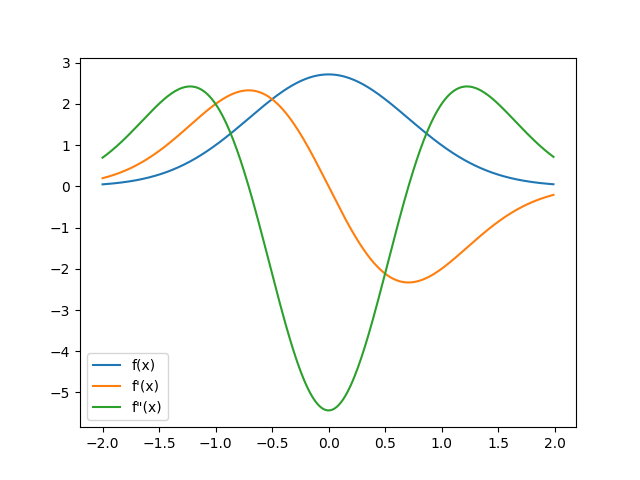Note
Go to the end to download the full example code.
Examples of mathematical expressions¶
Example of manipulating mathematical expressions and calculation of derivatives.
Michel Bierlaire, EPFL Sat Jun 28 2025, 15:54:00
import numpy as np
from biogeme.function_output import FunctionOutput, NamedFunctionOutput
from biogeme.jax_calculator import (
CallableExpression,
create_function_simple_expression,
get_value_and_derivatives,
)
try:
import matplotlib.pyplot as plt
can_plot = True
except ModuleNotFoundError:
can_plot = False
from biogeme.expressions import Beta, exp
# ##
# We create a simple expression:
b = Beta('b', 1, None, None, 0)
expression = exp(-b * b + 1)
We can calculate its value. Note that, as the expression is calculated out of Biogeme, the IDs must be prepared. So the parameter ‘prepare_ids’ is set to True
z = expression.get_value()
print(f'exp(-b * b + 1) = {z}')
exp(-b * b + 1) = 1.0
We can also calculate the value, the first derivative, the second derivative, and the BHHH, which in this case is the square of the first derivatives
the_function_output: FunctionOutput = get_value_and_derivatives(
expression, numerically_safe=False, use_jit=True
)
print(f'f = {the_function_output.function}')
f = 1.0
print(f'g = {the_function_output.gradient}')
g = [-2.]
print(f'h = {the_function_output.hessian}')
h = [[2.]]
print(f'BHHH = {the_function_output.bhhh}')
BHHH = [[4.]]
From the expression, we can create a Python function that takes as argument the value of the free parameters, and returns the function, the first, the second derivatives, and the BHHH.
fct: CallableExpression = create_function_simple_expression(
expression, numerically_safe=False, named_output=True, use_jit=True
)
By default, we want to calculate the gradient and the hessian
def the_function(x: float) -> NamedFunctionOutput:
# The generated function takes an array of betas as argument. In this example, there is only one.
beta = [x]
return fct(beta, gradient=True, hessian=True, bhhh=False)
We can use the function for different values of the parameter. Note that it takes as argument a vector of betas.
beta = 2.0
the_named_function_output: NamedFunctionOutput = the_function(beta)
print(f'f({beta}) = {the_named_function_output.function}')
print(f'g({beta}) = {the_named_function_output.gradient}')
print(f'h({beta}) = {the_named_function_output.hessian}')
f(2.0) = 0.049787068367863944
g(2.0) = {'b': np.float64(-0.19914827347145578)}
h(2.0) = {'b': {'b': np.float64(0.6970189571500952)}}
beta = 3.0
the_named_function_output = the_function(beta)
print(f'f({beta}) = {the_named_function_output.function}')
print(f'g({beta}) = {the_named_function_output.gradient}')
print(f'h({beta}) = {the_named_function_output.hessian}')
f(3.0) = 0.00033546262790251185
g(3.0) = {'b': np.float64(-0.0020127757674150712)}
h(3.0) = {'b': {'b': np.float64(0.011405729348685403)}}
if can_plot:
# We can also use it to plot the function and its derivatives
x = np.arange(-2, 2, 0.1)
# The value of the function.
f = [the_function(xx).function for xx in x]
# The gradient is element [1]. As it contains only one entry [0],
# we convert it into float.
g = [float(the_function(xx).gradient['b']) for xx in x]
# The hessian is element [2]. As it contains only one entry
# [0][0], we convert it into float.
h = [float(the_function(xx).hessian['b']['b']) for xx in x]
ax = plt.gca()
ax.plot(x, f, label="f(x)")
ax.plot(x, g, label="f'(x)")
ax.plot(x, h, label='f"(x)')
ax.legend()
plt.show()

Total running time of the script: (0 minutes 0.490 seconds)